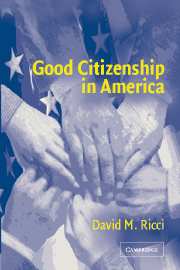5 - The Challenge to Good Citizenship
Published online by Cambridge University Press: 06 July 2010
Summary
By 1865, Americans had rebelled against Britain, created a republic, established democracy, and preserved the Union. Along the way, they came to regard their state as based on natural rights, egalitarianism, individualism, constitutionalism, federalism, separation of church and state, admiration for civil society, and respect for work. Together, these concepts justified citizenship rather than nationalism as the organizing principle of public life. Serious cases of exclusion remained, but hard politicking and social progress would eventually produce new suffrage legislation and, if necessary, constitutional amendments to the point where almost every American who is sane, without criminal record, and at least eighteen years old may now vote and hold elective office.
Accordingly, most Americans today possess not only the status of Citizenship I but also the rights of Citizenship II. But to what end? Here, the relevant concepts are those of covenant, social contract, common-wealth, and the republic as a community sharing a sense of justice. These concepts inform the notion of Citizenship III, of citizens using the rights of Citizenship II to maintain a good state that will foster well-being for its members.
Citizenship III is the hallmark of a decent society. It is not enough simply to vote; one should vote well. Yet Citizenship III calls upon men and women to act virtuously during changing circumstances and in situations plagued by ethical uncertainty. Accordingly, Citizenship III is no easy matter.
- Type
- Chapter
- Information
- Good Citizenship in America , pp. 109 - 134Publisher: Cambridge University PressPrint publication year: 2004



